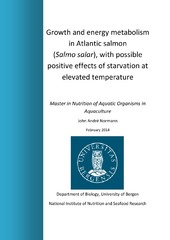Growth and energy metabolism in Atlantic salmon (Salmo salar), with possible positive effects of starvation at elevated temperature
Master thesis
Permanent lenke
http://hdl.handle.net/1956/8036Utgivelsesdato
2014-02-25Metadata
Vis full innførselSamlinger
Sammendrag
Due to global warming, the sea water temperature will probably increase, which may affect cold- water species like Atlantic salmon. It is therefore of great importance to see how elevated temperature will affect the growth and energy metabolism of Atlantic salmon, and investigate if starvation at elevated temperature can have positive effects on fish performance. Adult immature Atlantic salmon (700 g), were used. The fish was divided into three experimental groups, one fed ad libitum at 13°C , one fed ad libitum at 19°C , and one starved at 19°C . The trial period lasted for 60 days, prior to a 49 day long recovery period where all fish were fed ad libitum at 13°C. During the trial period feed intake was significantly higher at 19°C fed fish, compared to 13°C fed fish. However there was a lower level of IGFBP1b in plasma and down regulated igfbp1a in muscle, as well as higher plasma glucose concentrations in 19°C fed fish. Fish fed at 19°C also had a higher feed conversion ratio (FCR), lower nutrient retention and lower growth and mean body weight. Condition factor (CF), stored nutrient composition and organ somatic indexes did not change due to temperature. After recovery fish that were previously fed at 19°C had a lower feed intake than 13°C fed fish, and plasma IGFBP1b was still lower. There were still tendencies to higher FCR, and significant lower nutrient retention in fish previously fed at19°C. Weight and growth was therefore lower in fish fed at 19°C also during recovery. CF, stored nutrient composition and somatic indexes were normal during recovery. To investigate if starvation at elevated temperature can provide positive effects on growth regulation, 19°C starved fish was compared to 19°C fed fish. In 19°C starved fish during the trial period plasma GH levels and muscle ghr1 and ghr2 increased, and plasma IGF1 as well as muscle igf1 and igfbp1a decreased. Igf2 expression in muscle did not change in starved fish. Weight and growth decreased, while there were still seen a minor length growth. CF, stored lipid and energy, as well as HSI and VSI decreased. Stored protein concentration and CSI did not change due to starvation. During recovery fish previous starved at 19°C, showed higher feed intake (%BM), compared to 19°C fed fish. Growth regulating Hormones hormonal parameters showed normal concentrations and expression levels. There were seen tendencies to lower FCR, as well as significantly higher nutrient retention in fish previously starved. However, weight and growth did not completely recover. Also CF as well as stored energy and lipid were lower in fish previous starved, while somatic indexes were at normal levels. In summary, these results indicate that 19°C is to high temperature for optimal growth for Atlantic salmon. The low nutrient retention at 19°C indicates higher energy expenditure. However there was not seen mobilization of endogenous energy sources due to elevated temperature, and thereby no significant increase in catabolic activity. 49 days recovery period was not long enough for fish previously fed at 19°C to fully recover. Starvation at 19°C led to weight losses and increased catabolic activity, showed both by high levels of GH, low levels of IGF1 and use of endogenous lipid stores. Unchanged protein stores indicated that the starvation was not severe enough to deplete the lipid stores. Neither starved fish experienced full compensation growth during recovery, however there were seen compensatory tendencies in feed intake and nutrient retention
